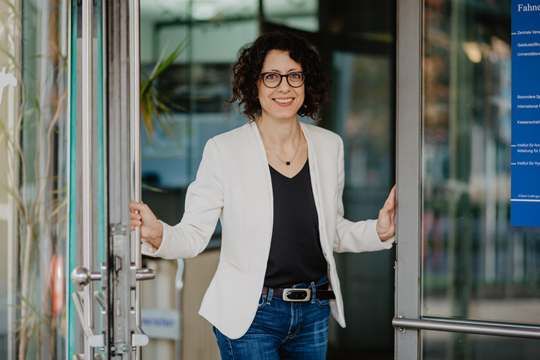Package Deal for Research
Freiburg, Jan 02, 2020
Katja Stempfle-Eberl has been promoting the University of Freiburg worldwide since March 2018, working in tandem with partners from research. What this involves, among other things, is making contact with researchers who are interested in coming to Freiburg. In this interview, she explains to Annette Kollefrath-Persch where the university is at an advantage and what she sees as her role.

Communicating and networking: Katja Stempfle-Eberl sees herself as a door opener, providing an initial point of contact for people interested in the University of Freiburg. Photo: Sandra Meyndt
Ms. Stempfle-Eberl, why should researchers from abroad come to Freiburg?
Katja Stempfle-Eberl: The University of Freiburg has a very good infrastructure. We’ve defined eight profile areas – like biological signaling research, work on functional and bioinspired materials, or research on the environment and sustainability – and three additional areas with particular potential, such as comparative area studies. These are areas in which we are very strong. Another important positive aspect is of course our close cooperation with the local Fraunhofer and Max Planck Institutes.
Where else does the university have an edge, in your opinion?
What shouldn’t be left out of the picture in regard to talented young international researchers is the so-called soft factors. One of the most important ones is the quality of life in Freiburg and the region, but factors like the actual and perceived security here in comparison with other countries and continents also play a part. We try to put together an overall package deal.
But why does the university need a marketing office for this? Don’t these factors speak for themselves?
No, because they need to be packaged and communicated in the right way. I have to make the package user-friendly and gear it toward various audiences – whether it’s researchers, partner universities, political decision-makers, or funding organizations. People always conjure up an image of the university in their heads, and this image shouldn’t be left to chance. We should create it ourselves.
Where does your work take you?
In the past year we have been present at all kinds of events, particularly abroad. Soon we will also be active at virtual trade fairs. What research marketing involves more than anything else is communicating and networking. That’s how it differs from product marketing. I see myself as a kind of door opener, providing an initial point of contact for people interested in Germany, Freiburg, the university, and its researchers.
What audiences do you try to reach?
Our doctoral programs are targeted at junior researchers worldwide. But it’s also important to convince researchers who have been working abroad for a time to come back. Researchers working in the USA, for example, have shown increased interest in returning to Germany in the past years. That is primarily a result of the current political situation there.
Does this put you in direct competition with universities in the USA?
No, there’s no comparison with the American universities in marketing, because it’s based on an entirely different system there. We look more at German and European universities. And Freiburg is right at the forefront in this respect as a research hub.
What goal have you set yourself for the coming year?
We of course intend to continue and extend the activities we have been engaged in so far. However, one important question will be how international research marketing can support Freiburg’s researchers even better. That’s something I’ll be occupied with in the coming months. In a team with colleagues from other departments, we aim to further improve the way we market the university as a whole.

